- Home
- Franz Kafka
The Burrow: Posthumously Published Short Fiction (Penguin Modern Classics) Page 2
The Burrow: Posthumously Published Short Fiction (Penguin Modern Classics) Read online
Page 2
MICHAEL HOFMANN,
Hamburg, June 2016
In the City
One winter’s afternoon, during a blizzard, Oscar M., an ageing student – if you looked at him from close to, you saw that he had terrifying eyes – Oscar M., in winter clothes and winter coat, scarf around his neck and a fur hat on his head, came to a sudden stop on the empty square. Whatever he was thinking was causing his eyes to blink rapidly. He was sunk so deep in thought that at one point he took off his hat and rubbed its coarse fur against his face. Finally he seemed to come to a conclusion, spun on his heel like a dancer, and headed home. When he opened the door of his parents’ flat, he saw his father, a fleshy-faced clean-shaven man, sitting at an empty table facing the door. ‘Not before time,’ he said, no sooner had Oscar set foot in the room, ‘and not a step closer, please, I am so furious with you that I can’t answer for the consequences.’ ‘But Father,’ said Oscar, and only then did he notice that he was all out of breath. ‘Quiet!’ yelled his father, and stood up, obscuring a window. ‘Quiet, I say. And but me no buts, all right?’ So saying, he picked up the table in his two hands and carried it one pace nearer to Oscar. ‘I can’t put up with your dissolute life a moment longer. I am an old man. I thought to have in you a support for my later years, but you’ve turned out to be worse than my illnesses. I’m disgusted by such a son, who by sheer laziness, prodigality, wickedness and stupidity is driving his old father to an early grave.’
At this point the old man fell silent, though his face continued to work as though he was still speaking. ‘Dear Papa,’ said Oscar, and cautiously approached the table, ‘calm yourself, everything will be all right. I have just had an idea that will make me the productive human being of your dreams.’ ‘What’s that, then?’ asked his father, staring fixedly into a corner. ‘Trust me, I’ll explain it to you over supper. Really, I was always a good son, only the fact that I wasn’t able to prove it to you so embittered me that, seeing that I was unable to delight you, I chose to annoy you instead. But now just let me take a turn in the fresh air to help me develop my thoughts.’ His father, who had initially been leaning against the table in growing attentiveness, stood up: ‘I don’t believe what you’ve just said is worth much. It’s just talk. But in the end you are my son. Come back soon, we’ll eat together, and you can tell me what’s on your mind.’ ‘That small indication of your confidence is enough for me. I thank you for it sincerely. But isn’t it apparent from my expression that I’m completely taken up with this serious plan?’ ‘I don’t know about that,’ said his father. ‘Perhaps it’s my fault, I’ve rather got out of the habit of looking at you at all.’ And so saying, it was a habit of his, he tapped on the table to indicate the passing of time. ‘The principal thing is that I have no confidence left in you, Oscar. If I yelled at you – I yelled at you when you came in, didn’t I? – then it wasn’t in any hope that it might improve you, I only did it thinking of your poor Mama, who, while she may not yet feel any pain over you, is already being weakened by her efforts to ward off such a pain (she thinks this is somehow in your interests). But in the end these are all things that you know very well, and I would have saved myself the trouble of mentioning them to you again, had you not provoked me with your promises.’
In the midst of these latest words the maid entered the room to see to the stove. No sooner had she left again than Oscar exclaimed: ‘But Papa! I would never have looked to you for such forbearance. If I’d had just a small idea, let’s say something towards my dissertation, which has been languishing in my bookcase these past ten years and is desperately in need of fresh ideas, then it’s just about possible, if hardly likely, that I would have come running home from my walk as happened today, and said, Father, I’ve had an idea. And if you had thereupon, with your respected voice, repeated your reproaches of a moment ago, then my idea would have been simply blown away and I should have had no option but to march off with or without a word of apology. Whereas now! Everything you say in objection to me helps my ideas – they don’t stop coming, they multiply and grow in my head. I will go now, because I need to be alone to put them in some order.’ He gulped for breath in the warm room. ‘Of course it could be some villainy you’ve got in your head,’ said his father with big, round eyes, ‘then I believe it would indeed get you in its grip. If it’s any kind of decent thought, though, it’ll disappear overnight. I know you.’ Oscar twisted his head, as though someone had him by the throat. ‘That’s enough. You’re picking away at me for no reason. The mere possibility that you might be able to predict the outcome accurately shouldn’t tempt you to disturb me in my good thoughts. Perhaps my past record gives you the right to do something like that, but it’s still wrong of you to make use of it.’
‘That only goes to show how great your uncertainty must be, if you are compelled to talk to me like that.’ ‘Nothing compels me,’ said Oscar, and his head gave a twitch. He went right up to the table, so that it was no longer possible to tell whose it was. ‘What I said, I said with respect and even with love for you, as you will see in due course, because my regard for you and Mama plays a leading role in my idea.’ ‘In that case I’d probably better thank you now,’ said his father, ‘seeing that it’s most unlikely that your mother and I will still be among the living when the proper time for thanks comes round.’ ‘Please, Father, let the future rest, as it deserves. If you wake it ahead of time, the only result is a sleepy-headed present. You shouldn’t need your son to remind you of that. Also, I wasn’t about to try and persuade you of anything, I was just announcing my idea. And that at least, as even you will have to admit, I’ve succeeded in doing.’
‘Now, Oscar, one thing still perplexes me: how is it that you’ve not come to me more often with such things? It accords so much with your nature. No, no, I’m serious.’
‘Well, if only you’d given me a good beating instead of listening to me. I came running here, God knows, to give you a pleasant surprise. But as long as my plan isn’t wholly thought through, I can’t tell you what it is. So why punish me for my good intentions and demand explanations of me that will only impede the execution of my plan?’
‘That’s enough now. I’m not interested anyway. But I had better tell you, because I can see you retreating to the door, obviously in some tearing rush to get somewhere: by your little device you have managed to allay the worst of my rage, with the result that I merely feel sadder than I did before, so I would like to beg you – if you like, I’ll even fold my hands like this – at least not to breathe a word about your ideas to your mother. Be satisfied with me.’
‘This is not my father who’s speaking to me in this way,’ cried Oscar, his hand already on the doorknob. ‘Either something’s happened to you since midday or you’re a stranger, someone I’ve never met before, in my father’s stead. My true father’ – for an instant Oscar stopped open-mouthed – ‘would have thrown his arms around me, he would have summoned my mother to come. What’s the matter with you, Father?’
‘I suggest you go and eat with your true father then. It promises to be much more agreeable.’
‘He will come, give him time. He can’t fail. And Mother will be there too. And Franz, whom I’m going to fetch now. Everyone!’ And with that Oscar barged into the door, as though to force it open, though it swung effortlessly.
Once he’d arrived at Franz’s lodgings, he bent down to the little landlady with the words, ‘It’s all right, the engineer is asleep, I know,’ and without paying any attention to the woman who, unhappy in view of the late visit, continued to pace uselessly back and forth in the corridor, he opened the glass door which shuddered as though he had touched it at some sensitive spot and called out boldly into the middle of the room which was almost completely dark: ‘Franz, get up! I need your advice. But I don’t want to stay here, I want to take a walk. Also I want you to come and eat with us. So hurry up.’ ‘At your service,’ came the reply from the engineer on his leather sofa, ‘but what are we doing first – getting up, ea
ting, walking or advising? I expect there are some other things I’m overlooking as well.’ ‘Above all, Franz, no jokes. That’s the most important thing of all, I forgot to say.’ ‘Well, I can oblige. But as for getting up – I’d rather eat twice on your behalf than get up once.’ ‘Now, up you get! No resistance.’ Oscar grabbed his friend by the lapels and pulled him into a sitting position.
‘I say, you do mean it, don’t you. Respect.’ He rubbed his eyes with both little fingers. ‘Tell me, has anyone ever bodily lifted you off a sofa like that?’ ‘Go on, Franz,’ said Oscar with a grimace, ‘go on and get dressed. I’m not an idiot to go waking you for no reason.’ ‘Nor am I an idiot for sleeping with no reason either. I was on night-shift yesterday, and I missed out on my afternoon nap today as well, on account of you.’ ‘What?’ ‘Oh, I’m just annoyed by how little attention you pay me. Not for the first time either. Of course, you’re a student with no commitments, free to do as you please. Not everyone’s so lucky. Then surely to goodness you have to pay a bit of respect to others. I am your friend, but that’s not what keeps me in my job.’ He demonstrated by waving the palms of his hands about in the air. ‘Doesn’t the eloquence rather suggest that you’ve had more than enough sleep,’ said Oscar, who was braced against a bedpost, from where he eyed the engineer as though he had more time than before.
‘What do you want me to do? Or, if you like, why did you wake me up?’ asked the engineer, scratching at his throat behind the goatee beard, in that closer intimacy one has with one’s body after sleep. ‘What I want you to do,’ said Oscar, tapping the bed frame with his heel. ‘Very little. I told you what it was from the corridor: to get dressed.’ ‘If you mean to suggest by that, Oscar, that your news is of very little interest to me, then I’m bound to say you’re right.’
‘So much the better, because in that case the fire it will light in you will be lit all by itself, and won’t rely on our friendship at all. Your advice will be clearer too. I need clear advice, please bear that in mind. And now if you happen to be looking for your collar and tie, they’re over on the armchair.’ ‘Why, thank you,’ said the engineer, beginning to put them on. ‘Perhaps you are a reliable person after all.’
The Village Schoolmaster
Those, and I count myself among them, who find an ordinary mole disgusting, would probably have died of disgust if they had seen the giant mole that was spotted a few years ago in the vicinity of a small village which thereby gained a measure of fleeting fame. Now, admittedly, it’s long since sunk back into obscurity, like the whole episode, which has remained a riddle, not that any very great efforts have been undertaken to explain it, and which – as a consequence of the baffling neglect of precisely those minds that should have devoted themselves to it, but instead devoted their energy to the explanation of things of much less consequence – has been forgotten for want of a detailed investigation. The fact that the village is a long way from any railway line can hardly serve as an excuse. Many people came there out of curiosity from far away, some even from abroad; yet those who should have showed a little more than curiosity failed to come. Yes, if it hadn’t been for ordinary people, people whose daily round barely gave them a moment to catch their breath, if it hadn’t been for the selfless efforts of such people, then the rumour of the phenomenon would probably have scarcely left the confines of the parish. It should be admitted that even rumour, something ordinarily so hard to brake, in this particular instance was positively sluggish, and if it hadn’t been given a nudge or two, it might never have got going at all. But not even that was any reason not to take time with this phenomenon; the thing simply deserved to have been investigated.
Instead of which, the only written account was left to an old village schoolmaster, an excellent man in his profession, no question, but whose gifts, like his training, were hardly such as to permit him to offer so much as a basic description, much less any explanation. His treatise was printed and sold in many copies to the then inhabitants of the village, where it met with a measure of praise, but the teacher was sensible enough to see that his isolated and unsupported efforts were basically valueless. If he nevertheless chose to persist in them and made of the affair, in spite of its annually increasing difficulty, his life’s work, then that goes to prove, on the one hand, the importance the phenomenon might have had, and on the other, the degree of stamina and unwavering conviction that can be found in an old unregarded schoolmaster.
The fact that he suffered badly from his rejection by influential parties is demonstrated by a short postscript he appended to his monograph, admittedly after an interval of some years, at a time, therefore, when hardly anyone could remember the original matter. In this postscript he attacks – his accusation hardly persuasive by its deftness, but by its honesty – the incomprehension he met with in people where it should have least been expected. Of these people he remarks aptly: ‘It is they, not I, who talk like an old village schoolmaster.’ And he cites, among other things, the reaction of an expert whom he sought out in the matter. The expert is not named, but it is not difficult to guess his identity. After the schoolmaster had overcome great difficulties to gain admission from the expert, to whom he had announced his visit several weeks previously, he noticed from the moment of their meeting that the expert harboured invincible prejudices regarding the affair. The degree of inattention with which he heard the lengthy report the schoolmaster made on the basis of his monograph may be judged by a remark he passed after some apparent pause for reflection.
‘Yes, moles come in all types and sizes. There where you live, the earth is especially rich and black. Well, it stands to reason that the nutrition it gives to moles will be especially abundant, and it’s only to be expected that they will grow to an unusual size.’ ‘But not as big as that!’ exclaimed the schoolmaster, and exaggerating a little in his rage, he paced off some seven feet along the wall. ‘Oh, yes,’ said the expert, to whom the whole business obviously felt a little ridiculous, ‘why ever not?’ Thus snubbed, the schoolmaster went home. He tells how, that evening in the falling snow, his wife and six children came to meet him on the road, and he was compelled to acknowledge the final failure of all his hopes.
At the time I read about this treatment afforded to the schoolmaster, I was not yet acquainted with his opus. But I decided straightaway to collect and assemble all the materials I could in the case. Since I could hardly shake my fist in the expert’s face, I wanted my writing at the very least to speak up for the schoolmaster, or, better, not the schoolmaster per se so much as the good intentions of an honest man with little influence. I will admit I later regretted this decision, because I soon came to feel that putting it into effect could not but put me in a false position. On the one hand, my own influence was hardly such as to be able to bring the expert, much less public opinion on the whole, round to the teacher’s views; on the other, the teacher was bound to notice that I was less concerned with his principal goal, the proof of the appearance of the giant mole, than with the unasked-for defence of his good name, which would seem to him to stand in no need of my defence.
So, as was bound to happen, in seeking to associate myself with the teacher, I met with his incomprehension, and probably instead of helping, soon stood in need of a new helper myself, whose appearance on the scene was highly unlikely. Moreover, my engagement on his behalf involved me in a great deal of work. If I wanted to convince people, I couldn’t rely on the teacher who, it seemed, had little power to convince. Knowledge of his monograph would only have muddied the water, and I therefore avoided reading it until my own work was completed. I didn’t even get in touch with him. Of course, through intermediaries, he got to hear of my inquiries, but he had no idea whether I was with him or against him. He perhaps thought the latter, though he was to deny this later on, because I have proof that he tried to put obstacles in my path. This was not at all difficult for him, seeing as I was obliged to carry out all the investigations he had already conducted, and he was able to anticipate me at eve
ry turn. But this was the only objection that could reasonably be made to my approach; an unavoidable objection, and limited as much as possible by the self-denying scrupulousness of my conclusions. Other than that, my paper was free of any influence on the part of the teacher; it is possible I was even over-scrupulous in this regard. It really was as though no one had yet investigated the case at all, as though I were the first to interview the witnesses, the first to collate the accounts, the first to draw conclusions.
When I subsequently read the teacher’s treatise – it had the terribly cumbersome title: A Mole Larger Than Any Yet Seen – I found a number of differences, even though we both thought we had proved our main thesis, which is to say the mole’s existence. Still, odd points of difference between us got in the way of the friendly relationship with the teacher that I had expected to result. There was on his side almost a kind of hostility. He remained modest and humble with me, but that made it all the easier to sense his true feelings. He seemed to think I had damaged both him and his cause, and that my belief that I had helped him, or might have helped him, was at best foolishness and more likely arrogance or duplicity. Above all, he would often point out that his opponents thus far had either not shown their opposition, or else done so only in person, or verbally, whereas I had deemed it necessary to have my objections committed to print. Moreover, the few opponents who had delved into the subject, however superficially, had all paid regard to his, the teacher’s, point of view, before going on to express their own, whereas I had drawn conclusions from unsystematically collected and partly misunderstood results, which, even if they were broadly correct, were still bound to come over as unconvincing, both to the general public and to experts. And this when the least shimmer of implausibility was the very worst thing that could happen.

 Diaries of Franz Kafka
Diaries of Franz Kafka Metamorphosis and Other Stories
Metamorphosis and Other Stories The Castle: A New Translation Based on the Restored Text
The Castle: A New Translation Based on the Restored Text The Complete Stories
The Complete Stories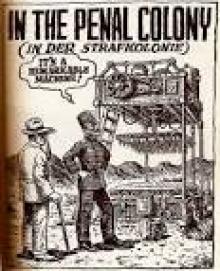 In the Penal Colony
In the Penal Colony The Trial
The Trial Amerika
Amerika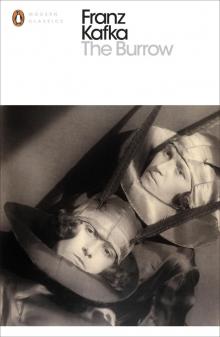 The Burrow: Posthumously Published Short Fiction
The Burrow: Posthumously Published Short Fiction Sons
Sons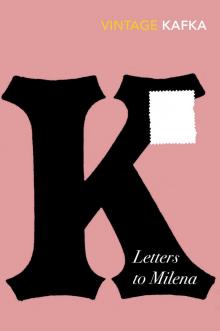 Letters to Milena
Letters to Milena Investigations of a Dog: And Other Creatures
Investigations of a Dog: And Other Creatures Collected Stories
Collected Stories The Great Wall of China
The Great Wall of China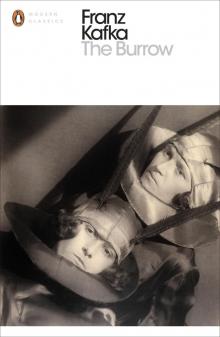 The Burrow
The Burrow The Castle
The Castle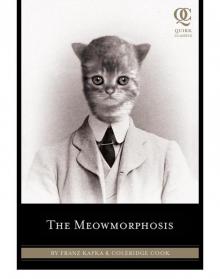 The Meowmorphosis
The Meowmorphosis The Sons
The Sons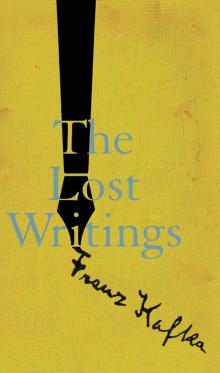 The Lost Writings
The Lost Writings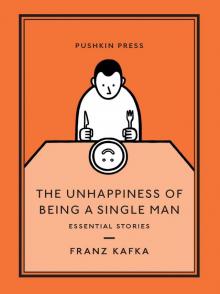 The Unhappiness of Being a Single Man
The Unhappiness of Being a Single Man Amerika: The Missing Person: A New Translation, Based on the Restored Text
Amerika: The Missing Person: A New Translation, Based on the Restored Text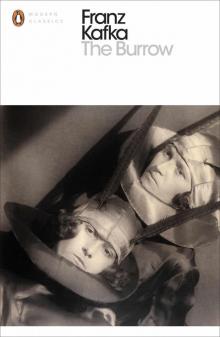 The Burrow: Posthumously Published Short Fiction (Penguin Modern Classics)
The Burrow: Posthumously Published Short Fiction (Penguin Modern Classics) The Diaries of Franz Kafka
The Diaries of Franz Kafka Investigations of a Dog
Investigations of a Dog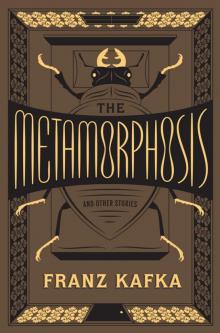 The Metamorphosis and Other Stories
The Metamorphosis and Other Stories The Trial: A New Translation Based on the Restored Text
The Trial: A New Translation Based on the Restored Text